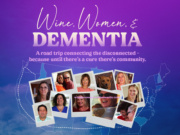Radio Show Podcasts
Wills and Trusts Are Not Tires, You Can’t Shop Prices
How do you make updates to your estate plan? Elder law attorney Steve Waltar joins Suzanne to talk about dos and don'ts. In particular, he explains that a power of attorney is not a commodity. They're all radically different.
Your Legal Documents: Are Kids Unequal?
With a new year arriving, it's time to consider reviewing and updating legal documents. Elder law attorney Steve Waltar joins Suzanne to talk about when to update estate plans.
10 Years in Jail for Breaking New LLC Law
Elder law attorney Steve Waltar joins Suzanne to talk about the Corporate Transparency Act, a new federal law made to thwart money laundering, but has overreaching implications for owners of new and existing small businesses and their legal agents across America.
Seeing Caregivers Celebrated and Heard
Kitty Norton, director of the film Wine, Women, & Dementia, joins Suzanne to talk about reactions to her documentary Wine, Women, & Dementia.
Kitty’s Top Tips for Caregivers
Kitty Norton, director of the documentary Wine, Women, & Dementia, joins Suzanne to offer her best advice for caregivers.
Caregiving: Things I Wish I’d Known
Kitty Norton, director of the documentary Wine, Women, & Dementia, joins Suzanne to talk about her movie's premiere on many PBS markets at various times beginning November 2. New York, San Francisco, and Los Angeles PBS stations will air it this month. Check local listings to see if it will air on your local PBS station.
Humor and Caregiver Smack: Wine, Women, & Dementia
Kitty Norton, director of the documentary Wine, Women, & Dementia, joins Suzanne to talk about her movie's premiere on PBS. Kitty talks about caregiving for her mom, blogging about everything that she and her sister were going through, using humor to cope and surrender to the moment. She became friends with people across the world who enjoyed the blog.
Unlocking Hope: Guide to Alzheimer’s Volunteering
Learn about various ways people can volunteer for the Alzheimer's Association. Alexis Bonoff, Program Director of the Alzheimer's Association in Washington state, joins Suzanne to talk about volunteering and also the organization's clinical trial match tool.
Support for Families With Alzheimer’s
How do you find resources and information to help care for families dealing with a senior loved one with Alzheimer's or dementia? Alexis Bonoff, Program Director of the Alzheimer's Association in Washington state, joins Suzanne to talk about how to find information, their 24/7 hotline, and more.
Decoding Alzheimer’s: How to Get Answers
Take advantage of the resources of the Alzheimer's Association to help care for families dealing with a senior loved one with Alzheimer's or dementia. Alexis Bonoff, Program Director of the Alzheimer's Association in Washington state, joins Suzanne to talk about the resources and programs.














